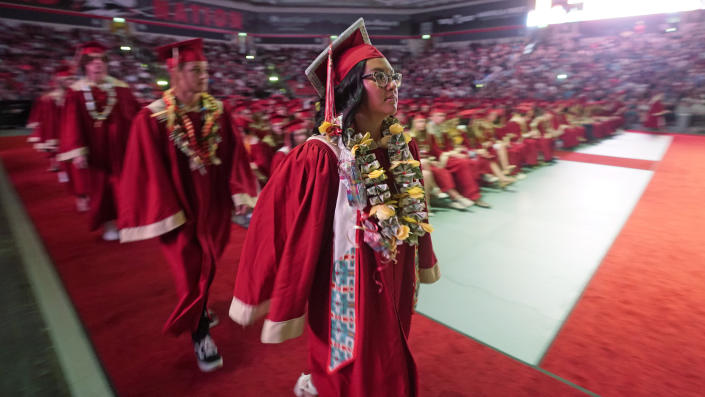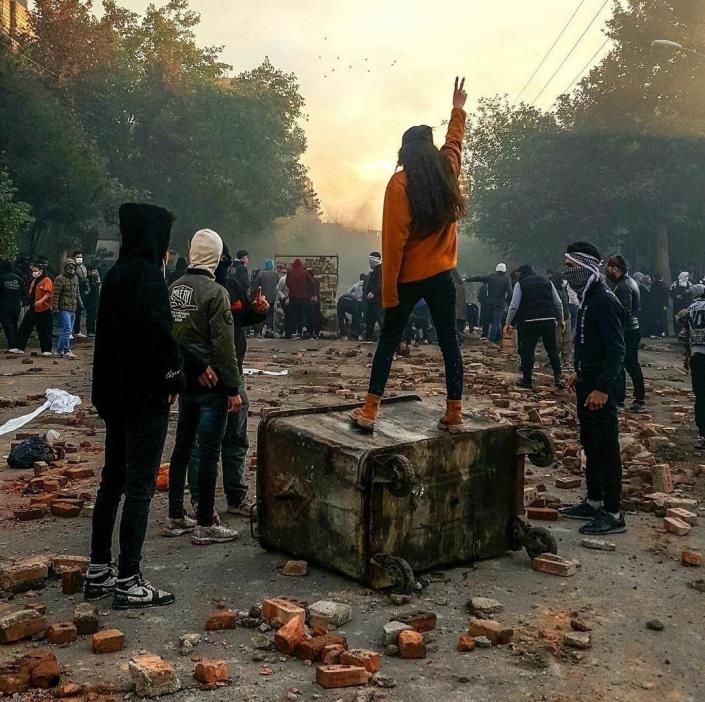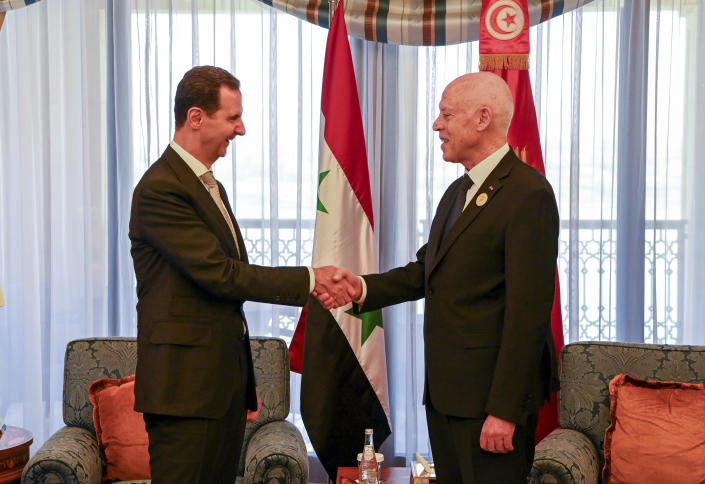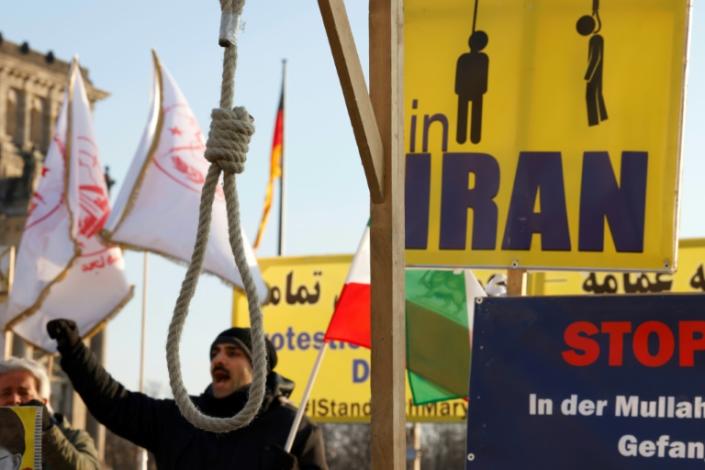World Geography And Politics Daily News | 20 May 2023

Views (215)

At graduations, Native American students seek acceptance of tribal regalia
When Kamryn Yanchick graduated, she hoped to decorate her cap with a beaded pattern in honor of her Native American heritage. Whether she could was up to her Oklahoma high school. Administrators told her no.

When Kamryn Yanchick graduated, she hoped to decorate her cap with a beaded pattern in honor of her Native American heritage. Whether she could was up to her Oklahoma high school. Administrators told her no.
Yanchick settled for wearing beaded earrings to her 2018 graduation.
A bill vetoed earlier this month by Oklahoma Gov. Kevin Stitt, a Republican, would have allowed public school students to wear feathers, beaded caps, stoles or other objects of cultural and religious significance. Yanchick, a citizen of the Seminole Nation of Oklahoma and descendent of the Muscogee Nation, said she hopes the legislature tries again.
Being able to “unapologetically express yourself and take pride in your culture at a celebration without having to ask a non-Native person for permission to do so is really significant,” said Yanchick, a Native American policy advocate and a former intern with the American Civil Liberties Union of Oklahoma.
High schools, which often favor uniformity at commencement ceremonies, take a range of approaches toward policing sashes, flower leis and other forms of self-expression. Advocates argue the laws are needed to avoid leaving it up to individual administrators.
When Jade Roberson graduated from Edmond Santa Fe High School, the same school attended by Yanchick, she would have liked to wear a beaded cap and a large turquoise necklace above her gown. But it didn't seem worth asking. She said a friend was only able to wear an eagle feather because he spoke with several counselors, consulted the principal and received a letter from the Cherokee Nation on the feather's significance.
“It was such a hassle for him that my friends and I decided to just wear things under our gown,” said Roberson, who is of Navajo descent. “I think it is such a metaphor for what it is like to be Native.”
When Adriana Redbird graduates this week from Sovereign Community School, a charter school in Oklahoma City that allows regalia, she plans to wear a beaded cap and feather given by her father to signify her achievements.
“To pay tribute and take a small part of our culture and bring that with us on graduation day is meaningful,” she said.
In his veto message, Stitt said allowing students to wear tribal regalia should be up to individual districts. He said the proposal could also lead other groups to “demand special favor to wear whatever they please" at graduations.
The bill's author, Republican state Rep. Trey Caldwell, represents a district in southwest Oklahoma that includes ancestral land of Kiowa, Apache and Comanche.
"It’s just the right thing to do, especially with so much of Native American culture so centered around right of passage, becoming a man, becoming an adult," he said.
Several tribal nations have called for an override of the veto. Cherokee Nation Principal Chief Chuck Hoskin Jr. said the bill would have helped foster a sense of pride among Native American students. Muscogee Nation Principal Chief David Hill said students who “choose to express the culture and heritage of their respective Nations” are honoring their identity.
It means a lot that the bill was able to garner support and make it to the governor, Yanchick said, but she wishes it wasn't so controversial.
“Native American students shouldn’t have to be forced to be activists to express themselves or feel celebrated,” she said.
___
Mumphrey reported from Phoenix. AP reporter Sean Murphy contributed to this story from Oklahoma City, Oklahoma.
___
The Associated Press education team receives support from the Carnegie Corporation of New York. The AP is solely responsible for all content.
Sudan's top army general formally fires rival paramilitary leader as his deputy in symbolic gesture
In a symbolic gesture, Sudan's top army general on Friday fired a paramilitary leader — his former ally turned deadly rival — as the deputy of the country's governing body, state media reported. Clashes broke out between the Sudanese army and a rival paramilitary force, the Rapid Support Forces, after their leaders failed to agree on the terms of a deal handing power over to a civilian government last month. The dismissal by Gen. Abdel Fattah Burhan of RSF commander Mohammed Hamdan Dagalo from the Sovereignty Council comes as the fighting between the two generals threatens to unleash a raging civil war in the African country.

CAIRO (AP) — In a symbolic gesture, Sudan's top army general on Friday fired a paramilitary leader — his former ally turned deadly rival — as the deputy of the country's governing body, state media reported.
Clashes broke out between the Sudanese army and a rival paramilitary force, the Rapid Support Forces, after their leaders failed to agree on the terms of a deal handing power over to a civilian government last month.
The dismissal by Gen. Abdel Fattah Burhan of RSF commander Mohammed Hamdan Dagalo from the Sovereignty Council comes as the fighting between the two generals threatens to unleash a raging civil war in the African country.
The monthlong conflict has already killed at least 705 people, the World Health organization said Friday.
The firing, reported by the state SUNA news agency, is unlikely to affect the battlefield where the warring sides appear locked in a stalemate and unwilling to end the hostilities. The paramilitary forces did not immediately comment.
The combat has been most acute in the Sudanese capital and in the western Darfur region.
In South Darfur's regional capital of Nyala, intense fighting between the army and RSF forces flared up Thursday killing at least 18 civillians, the Darfur Bar Association said, a legal group focusing on human rights.
Last weekend, more than 280 civilians were killed when RSF and other affiliated militias stormed the city of Geneina, also in the Darfur region, and clashed with armed residents, the Sudan Doctors Union said.
Last week, the two sides signed a U.S.-Saudi brokered pact vowing to better protect civilians caught in the crossfire. International efforts are underway to try and build a lasting truce.
Burhan appointed Malik Agar, a once prominent leader of the Sudan Revolutionary Front, a rebel movement in Sudan’s southern Blue Nile State, to replace Dagalo, SUNA said.
The United Nations and rights groups have accused Sudan's warring sides of human rights abuses. The army has been blamed for bombing residential areas and hospitals, while the RSF was condemned for looting, attacking civilians and turning civilian houses into operational bases.
The head of the Sudanese delegation at Friday's Arab League summit in Saudi Arabia urged other Arab countries to help end the crisis. Ali Osman, who is representing Burhan, warned that if the war continues it will have damaging regional repercussions. According to the U.N., at least 220,000 people have already fled Sudan to neighboring countries.
___
Associated Press writer Bassem Mroue contributed to this report from Jeddah, Saudi Arabia.
Iran defies US over executions, putting three democracy protesters to death
The Islamic Republic of Iran continues targeting protesters who took to the streets after the regime murdered a young Iranian-Kurdish woman for failing to cover her hair.

The Iranian-regime controlled Mizan News Agency, which is affiliated with the country’s opaque judiciary, reported that Saleh Mirehashemi, Majid Kazemi and Saeed Yaqoubi were executed on May 19 in a prison the city of Isfahan.
The Norway-based Iran Human Rights group said that there had been at least 90 executions in the last 18 days, marking May as the "bloodiest month" in the nation over the last five years.
"What we’re witnessing in Iran are not executions, but extrajudicial mass killings to create societal fear to maintain power," Iran Human Rights Director Mahmood Amiry-Moghaddam said.
He added, "It is clear from this episode that the Iranian regime has learned nothing from the protests that began with another death, the death of Mahsa Amini in September of last year. We once again urge Iran’s leadership to stop the killing, stop the sham trials, and respect people’s human rights. We are continuing to work in close coordination with our allies and partners around the world to condemn and confront these appalling human rights abuses."
Iran’s regime charged the three men with "waging war against God," a crime that is frequently applied against political activists and dissidents.
During the alleged forced confessions of the men on Iran state television, the men rejected the charge of murder.
The theocratic state implicated the men in a November 2022 incident, in which two Basij paramilitary force members and a law enforcement officer were fatally shot in Isfahan. The Basij is a subsidiary force of the U.S.-sanctioned terrorist entity Islamic Revolutionary Guards Corps, and the paramilitary movement is also proscribed as a terrorist entity by the U.S.
According to Radio Farda, which reports on Iran, family members and supporters of the trio engaged in protests in front of Isfahan’s prison. Iranian security forces imposed violence on the demonstrators.
The three men issued a handwritten letter on May 18 that was covertly released and published on social media, declaring, "Don't let them kill us. We need your help."
A total of seven protesters, including the three men, have been executed by the regime since the outbreak of nationwide protests in September. According to the London-based human rights organization Amnesty International, executions in the highly repressive state ballooned from 314 in 2021 to 576 in 2022.
However, German MP Norbert Rottgen, from the conservative Christian Democratic Union Party, tweeted, "No one knows if they could have been saved, but Germany & the EU don't even try. [German Foreign Minister Anna] Baerbock must finally look and find words for the horror that is taking place in Iran. Silence is not politics!"
Fox News Digital reached out to a diverse group of Iranian experts in the United Kingdom, the U.S. and Germany for comments on the executions.
Kazem Moussavi, a German-Iranian dissident and spokesman for the Green Party of Iran in exile, told Fox News Digital that the Islamic Republic’s Supreme Leader, Ali Khamenei, and its President, Ebrahim Raisi, should be included on the European Union terror list. The U.S. sanctioned Raisi for his role in two massacres of Iranians in 1988 and 2019.
Moussavi noted that "after the executions, opponents of the regime chanted ‘Death to the dictator’ in many residential areas of Isfahan and ‘Death to Khamenei."’
Isfahan is a major center for the Islamic Republic’s reported construction of its nuclear weapons program and a hub for missile production.
Moussavi and the Iranian dissident, Sheina Vojoudi, an associate fellow for the Gold Institute for International Strategy, played a key role in securing the temporary suspension of the Freiburg-Isfahan partnership. Freiburg is located in the German state of Baden-Württemberg, whose commissioner, Michael Blume, who is tasked with fighting antisemitism, has lashed out at Vojoudi and other Iranian dissidents who seek to the end the widespread human rights abuses of the Islamic Republic.
Vojoudi said, "Blume called people like me ‘corrupt exiled nationalists’ after I showed him the leaked footage of Evin prison and told him [that] only criticism won’t help us and as a defender of the human rights he should do more."
She continued, "But, in response, he insulted and discriminated against Iranians in exile. He called us corrupt, but the rulers of their twin city [partnership], the officials of the Islamic Republic, are the most corrupt people on earth."
Potkin Azarmehr, a British-Iranian expert on the theocratic regime, told Fox News Digital, "They can execute and kill freedom fighters, but they will not be able to kill a nation who yearns for freedom."
Marjan Keypour Greenblatt, an Iranian-American who is the director of the Alliance for Rights of All Minorities in the U.S., told Fox News Digital the "Iranian government does not play by any rules. It’s a rogue and defiant regime that takes the lives of its citizens to buy time for its own survival."
She continued, "The problem with executions is more complicated than the case of these three individuals. The Isfahan cases are three that are increasingly publicized and brought forth by the international community. But what’s beneath the surface of these hashtag campaigns are the cases that remain under the radar."
She added, "In the past few days, while activists were just becoming aware of the cases in Isfahan, at least 12 other prisoners were executed. Most of them remained unknown and undefended."
Alireza Nader, the engagement director for the U.S.-based National Union for a Democratic Iran (NUFDI), told Fox News Digital, "The latest executions in Isfahan show that the regime in Iran continues to try to terrorize the rebellious population into submission. The entire world, especially the U.S. and Europe, should hold the regime accountable and pressure it by ending all economic and diplomatic engagement while offering maximum support to the people of Iran."
.
Tunisian leader calls meeting with Syria's Assad 'historic,' buries memories of Arab Spring
Smiles, a handshake and what Tunisian President Kais Saied called a “historic meeting” with the long-ostracized Syrian leader Bashar Assad. The talks between the two presidents, held before the start on Friday of the Arab League summit in Saudi Arabia, buried memories, and perhaps the legacy, of the Arab Spring which started in Tunisia 12 years ago.

JEDDAH, Saudi Arabia (AP) — Smiles, a handshake and what Tunisian President Kais Saied called a “historic meeting” with the long-ostracized Syrian leader Bashar Assad.
The talks between the two presidents, held before the start on Friday of the Arab League summit in Saudi Arabia, buried memories, and perhaps the legacy, of the Arab Spring which started in Tunisia 12 years ago. That series of uprisings gave the North African country its first taste of democracy as protests rolled across the region, including in Syria.
“Today, I am absolutely convinced of Tunisian support for Syria,” a statement from Saied’s office said after what it called the “historic” meeting.
Tunisia, reborn after its 2011 revolution which toppled autocratic ruler Zine El Abidine Ben Ali, was among the fiercest critics of Assad. But Saied has largely trampled the gains of Tunisia's revolution since his 2019 election, notably by assuming near full powers after suspending the legislature in 2021 then dissolving it in his crackdown on corruption and dissent.
Tunisia resumed diplomatic relations with Syria in April, and Assad’s presence at the Arab League summit sealed Syria’s return to the club of Arab nations.
The official TAP news agency showed photos of him and Assad greeting each other with smiles, a warm hand shake and a sit-down for serious talks. Assad was invited to the residence where the Tunisian president was staying in Jeddah, the Saudi Arabian city hosting the summit.
Syria was kicked out of the club of Arab nations in 2011 at the start of its brutal civil war. That was months after Tunisia’s revolution.
“We stand together against the movement of darkness,” Assad said, apparently referring to extremist groups that came to dominate the Syrian opposition as his country’s war ground on, and militants groups there drew a large number of recruits from Tunisia.
In an interview with Tunisian television, Assad said that the North African country “used to be a platform to propagate the (Islamist) mindset.”
“After my meeting with Kais Saied, I am now convinced that the Arab people hasn’t changed and Tunisia is the same,” he was quoted as saying by the Radio Mosaique.
Among numerous figures jailed in Saied’s crackdown is Rached Ghannouchi, head of the moderate Islamist party that triumphed in Tunisia’s first free elections in October 2011. Ghannouchi was also speaker of the parliament that Saied dissolved.
Condemnation as Iran hangs three linked to Amini protests
Iran on Friday executed three men convicted of killing security force members during protests triggered by Mahsa Amini's death last year, drawing condemnation from Western governments.The authorities last year carried out the executions of four protesters, drawing international condemnation.

Iran on Friday executed three men convicted of killing security force members during protests triggered by Mahsa Amini's death last year, drawing condemnation from Western governments.
Majid Kazemi, Saleh Mirhashemi and Saeed Yaghoubi were found guilty of "moharebeh" -- or waging "war against God" -- for shooting dead three members of the security forces at a demonstration in the central city of Isfahan on November 16, the judiciary said on its Mizan Online news website.
Iran witnessed waves of nationwide protests following the September 16 death of 22-year-old Amini, an Iranian Kurd who had been arrested for an alleged breach of the Islamic republic's strict dress rules for women.
During the protests, which Tehran labelled as foreign-instigated "riots", thousands of Iranians were arrested and hundreds killed, including dozens of security personnel.
Friday's hangings bring to seven the total number of Iranians executed in connection with the demonstrations.
The European Union condemned the executions "in the strongest possible terms", foreign policy chief Josep Borrell said in a statement.
He called on Tehran to "refrain from applying the death penalty and carrying out future executions", adding that authorities should abide by "their obligations under international law" and respect "the rights to freedom of expression and peaceful assembly".
Kazemi, Mirhashemi and Yaghoubi were arrested in November and sentenced to death in January.
They were also charged with membership of "illegal groups with the intention of disrupting national security and collusion leading to crimes against internal security", Mizan said.
It noted "evidence and documents in the case and the clear statements made by the accused" showed that "the shootings carried out by these three people led to the martyrdom of three (members of the) security forces".
Nazanin Boniadi, a British actor and activist of Iranian origin, tweeted that the three men had been "murdered... after forced confessions and sham trials".
- Surge in executions -
A video shared on social media on Friday and verified by AFP showed Tehran residents chanting "Death to the Islamic republic" and other slogans in the capital's Ekbatan district, the site of repeated protest actions.
The cases of the three men have caused concern abroad, including in Australia where some of Kazemi's family live.
His cousin Mohammad Hashemi wrote an open letter to Australian Foreign Minister Penny Wong asking for her support.
"Majid is only 30 years old. He is a compassionate, loving, and strong-willed person. He, like many other Iranians, participated in peaceful demonstrations to raise his voice and demand change," Hashemi wrote in the letter, published on the petition website change.org.
Wong on Friday condemned the execution, which she said "exemplifies the regime's brutality against its people".
"Australia stands with the people of Iran," Wong tweeted.
- Calls for 'robust response' -
The Independent International Fact-Finding Mission set up by the UN Human Rights Council said it found the latest executions "profoundly concerning" in view of "allegations of their having been convicted and sentenced through confessions obtained under torture".
Human rights group Amnesty International said it was "horrified by the chilling execution of these protesters" and called for a "robust international response".
"These executions are designed by the Iranian authorities to send a strong message to the world and the people of Iran that they will stop at nothing to crush and punish dissent," said its Middle East and North Africa deputy director, Diana Eltahawy.
"In the absence of a robust international response, the authorities will continue to revel, unabated, in their impunity with lethal consequences for people in Iran.”
The authorities last year carried out the executions of four protesters, drawing international condemnation.
Iran executes more people a year than any other nation except China, according to Amnesty.
Since the start of the year, Iran has witnessed a surge in executions on various charges.
The authorities hanged 75 percent more people in 2022 than the previous year, IHR and Paris-based Together Against the Death Penalty said in a joint report in April.
At least 582 people were executed in Iran last year, the highest number of executions in the country since 2015 and well above the 333 recorded in 2021, the two groups said.
Earlier this month, UN rights chief Volker Turk sounded the alarm over Iran's "abominable" track record this year, with an average of more than 10 people being put to death each week.
Advocacy groups have warned that members of ethnic minorities have been disproportionately targeted in the current wave of executions.
bur/ami-kir/hkb
Britain faces ‘cheese blockade’ on purchases from Europe
Britain faces a "blockade" on cheese and meat products from Europe, under plans for new Brexit border checks, the Government has been warned.

Britain faces a "blockade" on cheese and meat products from Europe, under plans for new Brexit border checks, the Government has been warned.
Industry leaders have sounded the alarm over proposals to introduce border controls on goods arriving from the continent from the end of October.
Last month, ministers involved plans to finally introduce safety checks that have been delayed since Britain left the EU at the start of 2020.
Shane Brennan, the chief executive of the Cold Chain Federation, warned the controls would make it much harder to bring some goods into the UK.
“It’s going to come as a massive shock to the system, and there will be paralysis as a result while everything has to reset.
“We’re not talking about shelves being empty. We’re talking about the choice being severely reduced, particularly in the first eight to 12 weeks.
Mr Brennan called for a Government rethink, saying the need for veterinary checks was “a 19th century solution to a 21st century problem”.
“We’re putting our food supplies at the mercy of German Polish and Dutch vets, who have no interest in whether it gets to us or not,” he added.
EU countries applied the full range of checks to goods arriving from Britain on the first day after Brexit, but the UK delayed reciprocating.
But some sectors, notably the farming industry, have pushed hard for checks to be brought in on goods arriving from the EU.
After their initial plans for border controls were dismissed as unworkable, Whitehall officials came back with the new model last month.
They said it will save businesses £400 million a year, compared with the original plan, and create a “world-class” digital frontier.
But the new system was still expected to cost businesses £600 million more than the status quo and it will not be fully implemented for 18 months.
“We are protecting UK consumers and businesses, while using tech and data to remove burdens wherever possible,” she told them.
Britain is legally bound to introduce checks on EU goods under both the terms of the Brexit trade deal and World Trade Organisation rules.
0 Likes
